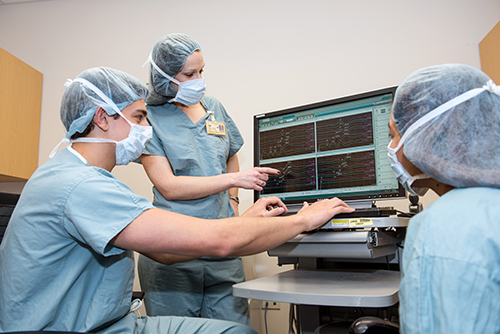Neuromonitoring has become essential in modern operating rooms. We provide this specialized service to protect patients during procedures that pose risks to nerve function. The surgical landscape has changed dramatically with the integration of this technology, making certain operations safer than ever before.
The basic concept of neuromonitoring involves tracking electrical signals that travel through nerves. Our team uses specialized equipment to send tiny electrical pulses through specific neural pathways and measure how these signals travel. During surgery, if something interrupts these pathways – such as pressure, stretching, or temperature changes – the signals change in characteristic ways. These changes alert the surgical team to potential problems before permanent damage occurs.

Surgeons rely on our expertise to interpret complex neurological data. The human nervous system contains billions of connections, making its monitoring a specialized field. Our technicians have undergone extensive training to understand these patterns and communicate relevant changes to the surgical team. This communication happens in real-time, allowing for immediate adjustments to surgical approach when needed.
Multiple types of surgeries benefit from neuromonitoring. Spinal fusions, tumor removals, vascular repairs, and many other procedures carry risks to nearby nerves. Without monitoring, surgeons must rely solely on visual identification of nerve structures, which isn’t always sufficient. Our monitoring provides functional information about these nerves, confirming whether they remain healthy throughout the procedure.
The cost of neuromonitoring represents a small fraction of overall surgical expenses but delivers significant value. Insurance companies increasingly recognize this value and provide coverage for monitoring services. The prevention of even one serious nerve injury saves tremendous costs in long-term care and rehabilitation. More importantly, it spares patients from potential lifetime disability.
Hospitals that implement comprehensive neuromonitoring programs typically report better surgical outcomes. The data collected during these procedures also contributes to research that continues to improve surgical techniques. Our team participates in this advancement by maintaining detailed records of monitoring sessions and identifying patterns that lead to better practices.
We understand that facing surgery creates anxiety for patients and families. Knowing that additional safeguards protect nerve function provides comfort during stressful times. If you or someone you care about has an upcoming surgery, ask about the inclusion of neuromonitoring as part of the surgical plan. This conversation could make a significant difference in surgical outcomes. To learn more about how our neuromonitoring services enhance surgical safety, visit our website at https://epiomneuro.com/ for detailed information about our approach and the procedures we support.
